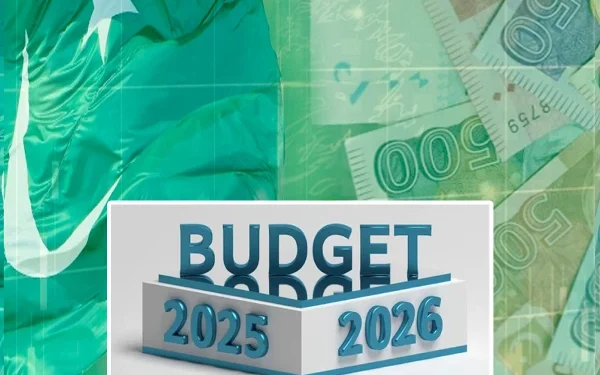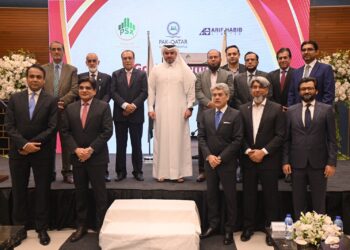Islamabad – As Pakistan prepares to unveil its fiscal budget for the year 2025-26, the government is likely to set an ambitious tax collection target of over Rs 14.3 trillion, marking a significant increase of Rs 2 trillion from the revised target for the current fiscal year. In a crucial step towards achieving this goal, the Federal Board of Revenue (FBR) is assessing measures that could generate at least Rs 500 billion in new tax revenue.
Record-High Tax Target Reflects Fiscal Pressure
According to senior officials from the Ministry of Finance and the FBR, the provisional revenue target for the next fiscal year is Rs 14.307 trillion, which equates to approximately 11 percent of Pakistan’s projected Gross Domestic Product (GDP). This target reflects the government’s intent to widen the tax net and enhance revenue generation at a time when the country is grappling with a fragile economic recovery.
The tax goal is 16 percent higher than the revised target of Rs 12.3 trillion for the current fiscal year, which itself was reduced from the original target of Rs 13 trillion due to slower-than-expected growth and declining inflation.
Economic Context: A Tough Road Ahead
Pakistan’s economy has been navigating through turbulent waters, including high inflation, currency devaluation, external debt repayment pressure, and stalled foreign investments. The low GDP growth and subdued business activity have made tax collection efforts more difficult for the FBR, which often falls short of its collection goals.
The upcoming budget will be presented in a challenging macroeconomic environment, with the International Monetary Fund (IMF) closely monitoring fiscal developments as part of its lending program. An IMF delegation is scheduled to arrive in Pakistan on May 14 for a comprehensive review of the budget and economic reforms.
Finance Minister Aurangzeb’s Second Budget Speech Due in Early June
Finance Minister Muhammad Aurangzeb, who took charge of the ministry earlier this year, is expected to present his second federal budget in the first week of June, likely before the Eid holidays on June 2 or 3. Speaking to reporters, he confirmed that budget proposals from trade bodies and industry associations are still being received and evaluated by the finance ministry.
The minister acknowledged the challenges in achieving the proposed target but reiterated the government’s commitment to fiscal discipline, increased documentation of the economy, and greater transparency in tax administration.
Additional Revenue Measures Being Considered
To meet the projected Rs 14.3 trillion tax target, authorities are actively exploring additional revenue measures worth at least Rs 500 billion. These will be in addition to the Rs 1.3 trillion in new tax proposals already under discussion.
Sources indicate that these measures may include:
- Expanding the tax base
- Broadening GST coverage
- Digitization of tax collection
- Reducing tax evasion through stricter enforcement
- Phasing out unnecessary tax exemptions
IMF’s Approval Is Crucial for Final Target
The tax target and proposed measures are still subject to approval by the IMF, which plays a critical role in shaping Pakistan’s fiscal policies due to its $3 billion standby arrangement with Islamabad. The IMF’s team is expected to vet all major policy decisions and revenue projections, including the Rs 14.3 trillion tax target, during its upcoming review.
Without IMF backing, Pakistan risks delays in receiving critical financial disbursements and maintaining investor confidence.
Key Recommendations from the Business Community
In preparation for the new budget, the Overseas Investors Chamber of Commerce and Industry (OICCI) and other trade bodies have submitted extensive proposals aimed at fostering business growth, encouraging formalization of the economy, and easing the tax burden on compliant taxpayers.
Notable suggestions include:
- Abolition of the Rs 5,000 currency note to curb the undocumented cash economy.
- Exemption for chemical dealers from withholding tax to encourage transparency.
- Removal of the 10% super tax on individual incomes above Rs 10 million.
- Tax exemption or token tax of Rs 1,000 for annual income up to Rs 1.2 million to retain filer status among low-income groups.
- Special exemptions for Pakistani expatriates, including on capital value tax.
- Reduction of corporate tax rate from 29% to 25% over a phased period to stimulate investment.
- Gradual abolition of super tax over three years.
- Zero sales tax on local supplies under the Export Facilitation Scheme.
- Lowering sales tax on packaged milk from 18% to 5% to support the dairy industry.
- Reduction of sales tax on mineral water and juices, aiming to provide relief to consumers and promote the beverage sector.
Tax Base Expansion and Structural Reform
Achieving the ambitious tax target will also require structural reforms in Pakistan’s tax system. The FBR has been under pressure to improve efficiency, reduce corruption, and bring more individuals and businesses into the formal tax net. Currently, less than 3 million people in Pakistan file income tax returns out of a population of over 240 million, reflecting a dangerously narrow tax base.
Experts have urged the government to:
- Utilize technology and data analytics to identify potential taxpayers.
- Integrate NADRA and FBR databases to track high-value transactions.
- Mandate digital invoicing systems to ensure sales documentation.
- Introduce real estate valuation reforms to curb underreporting.
Political and Social Considerations
With rising living costs and widespread economic anxiety, any additional tax burden is likely to be met with public criticism. Policymakers must strike a balance between revenue generation and public relief, especially for the middle and lower-income groups.
The 2025-26 budget is seen as a litmus test for the newly formed government, which must demonstrate its ability to stabilize the economy, fulfill IMF obligations, and stimulate inclusive growth without alienating key stakeholders.
Conclusion: High Stakes Ahead for Budget 2025-26
As the government gears up to present the Budget 2025-26, the Rs 14.3 trillion tax target reflects not just fiscal ambition but also the immense pressure to meet IMF requirements, plug budget deficits, and strengthen the economy. While the target is bold, its success depends heavily on implementation of effective policies, business cooperation, and external support.
The coming weeks will be critical in shaping Pakistan’s fiscal direction, and all eyes will be on how the government navigates this complex economic terrain to deliver a realistic yet growth-oriented budget.

























